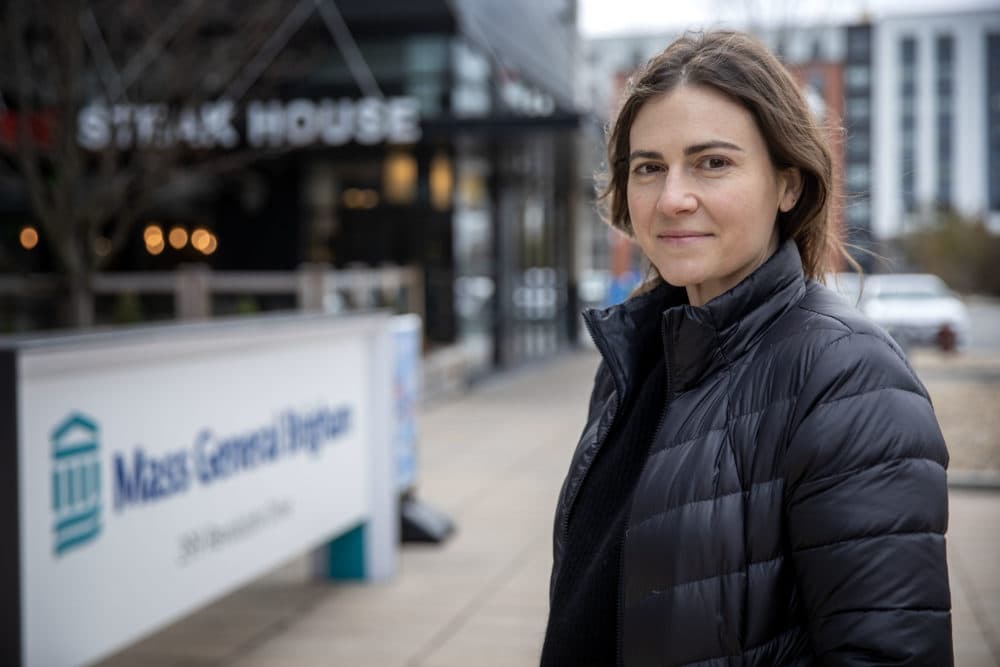Advertisement
A peek inside a hospital’s legal hotline: 3 medical pickles

Imagine you’re a doctor. There’s a patient next to you, and you’re not sure what to do. But it’s not a medical quandary. It’s a legal one.
This happens often enough that the Mass General Brigham hospital system operates a legal hotline. A team of in-house lawyers staff the hotline 24/7, so clinicians can get guidance whenever they need it.
“Sometimes they need an answer in 0.2 seconds,” said Emma Melton, senior legal counsel at MGB, who staffs the hotline along with other “patient care” attorneys. “Sometimes we have a few minutes [or] a few hours to think through something.”
When on-call, Melton answers questions through the night and weekend. She said July is a particularly busy month (when medical students become brand new doctors), and around the holidays volume ticks up too (since that’s a period when extra family time can exacerbate tensions). But sometimes, Melton said, clinicians call for moral support.
“Sometimes they aren’t clear about having a legal issue, but say, ‘I'm in a pickle, I need some help.’ And so they call us,” she said. “It's about just being on their team, even if it’s not purely a legal question.”
WBUR spoke with Melton about the most common — and the most fascinating — questions she hears. Although she can’t reveal actual details, she presented three hypothetical cases and explained how lawyers might puzzle them through. They offer a window into the types of legal questions that arise in a hospital system.
Scenario #1: No place to go
An elderly man no longer needs to be in an acute care hospital, but he does need the support of a rehabilitation facility. However, because of a history of violence, his medical team cannot find any facility that’s willing to take him, and his family is unable to provide the care he needs at home. What should the medical team do? Should they discharge this patient? Should they keep him in the hospital indefinitely? Something else?
What would Melton say?
Click here to find out.
The answer? The patient stays put
Melton said the man would stay in the critical care hospital — sometimes for months or longer — even though it’s not medically needed.
That's because the hospital has an obligation to provide a safe and appropriate discharge for all patients. Rehab facilities and long-term care facilities get to decide who they accept. Should they all decline, the hospital keeps the patient "if they can't go home," Melton said.
She acknowledged this isn’t ideal for the patient, who needs rehab services and would likely prefer a quieter setting than a hospital.
“Setting aside that tragic reality, it's also kind of ridiculous that they're just taking up this acute-care bed. That's a poor use of financial resources, a poor use of medical resources,” Melton said, pointing out that there’s a bed shortage facing many hospitals.
Scenario #2: Who decides for the fetus?
A woman with substance use disorder is using drugs that are dangerous to the fetus throughout the pregnancy. She indicates to her medical team that she intends to continue using. Can her providers stop her from using drugs or do something else to protect the fetus?
What would Melton say?
Click here to find out.
The answer? It's up to the pregnant person
Under Massachusetts law, a fetus only becomes a person once born. Thus, the mother has full bodily autonomy up until delivery is complete.
“The legal premise that the fetus does not have independent rights supports our abortion rights in Massachusetts,” said Melton. “[The Department of Children and Families] cannot take custody of a fetus prematurely because, legally, there’s no child until it is born.”
Once the child is born, the clinicians can contact DCF.
And under state law they are required to do so if they believe a child is in danger of abuse or neglect. But that call has to wait until after delivery, and is dependent upon the clinicians having indications that the infant is at future risk. It's also worth noting that only DCF can take custody of the child (a hospital isn't allowed to do that). However, the hospital can offer the person services for substance use disorder, as long as they are entirely voluntary.
Scenario #3: Estranged family
A woman loses consciousness in a car accident. Her health care proxy form is decades old. It says her husband should make medical decisions for her, but they’ve been estranged — although not divorced — for a long time. Who gets to make decisions about this woman’s medical care?
What would Melton say?
Click here to find out.
The answer? Sometimes the court decides
In Massachusetts, a health care proxy is automatically revoked due to divorce — but not separation or estrangement. Usually, Melton says the estranged partner will turn over responsibility to someone more appropriate. But sometimes, Melton said hospital staff get into a difficult situation where the unconscious patient doesn't have a new partner and doesn't have family who can step into the role.
“We're stuck with the quandary of: Do we turn to that [estranged] person anyway? Or do we just get the court to appoint a total stranger because we're not sure we trust the husband’s goodwill towards this estranged partner?” said Melton.
If the care team is questioning the person's intentions (like if they seem to be eyeing money in the patient's will), then the hospital may ask the court to appoint what’s called a “corporate guardian” — a volunteer who can make medical decisions for the patient. A court would also weigh in if there were an estranged partner and a current partner battling over health care decisions.
“Some circumstances can get quite oppositional, which is an awful component to add on top of the already stressful situation of being in the hospital,” said Melton. That’s one reason she urges everyone to double check that they have an updated health care proxy form and share a copy with their physician.
